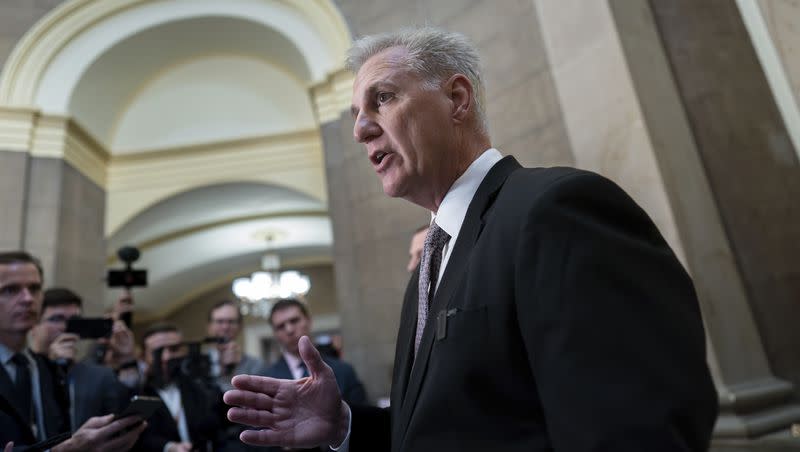Opinion: The House speaker is ousted, but the nation’s growing money problem is not going away

- Oops!Something went wrong.Please try again later.
Kevin McCarthy lost his position as Speaker of the House on Tuesday because he compromised with Democrats in order to avert a government shutdown at the last moment Saturday night.
So, now what?
Will Republicans in the House, driven by a handful of their right-wing colleagues, now stage a repeat of the lengthy fight that took 15 rounds to elect McCarthy last January? Or will this heavyweight fight be even longer and more acrimonious, considering there are no clear favorites and the party seems hostage to the will of a handful of its more rebellious members?
And what of the budget battle that, late last Saturday, was moved to Nov. 17? The world, and especially belligerent nations and terrorist groups, are watching carefully.
We sympathize, to an extent, with the concerns of McCarthy’s Republican foes. They are right to be frightened by the nation’s $33 trillion national debt and by a yearly budget deficit that is quickly approaching $1.8 trillion.
We have urged repeatedly, as have Sens. Mike Lee, Mitt Romney, as well as other members of Utah’s congressional delegation, to address this vital issue. No one knows when this debt will cross over a red line and begin poisoning the American economy. When that happens, a chain of uncontrollable events are likely to follow.
Interest payments on the debt will impede the nation’s ability to fund important programs, investors will lose confidence in U.S. bonds, demanding even higher returns, Washington will have little choice but to inflate the dollar to help meet obligations, taxes will rise, cuts will be mandated and American national interests will suffer as military funding is jeopardized.
If the House Freedom Caucus has gotten anything right, it is its relentless focus on overspending. But the combative methods of caucus members suggest anything other than the bipartisan cooperation that will be necessary to get things under control. The nation’s overspending problem is the fault of both parties, stretching over decades. The caucus’ antics, including the ouster of McCarthy, are little more than performance art.
Would the nation have been closer to solving this problem if McCarthy had allowed the government to shut down? No. In recent years, the nation has endured a “fiscal cliff,” “sequestration” and three actual government shutdowns (dating back to the mid-1990s) in an effort to either force fiscal responsibility or the inclusion of some pet spending project. None has produced real reform.
The tactic of closing the government doesn’t work. It does, however, harm the nation’s reputation abroad, even while making the nation appear vulnerable.
Now, Congress faces another budget deadline in roughly six weeks, but this time with the majority party of the House in disarray.
We would like to argue that all of this damages public trust, but that ship has sailed. The most recent Statista poll results show Congress with a 19% favorability rating nationwide, and that has changed little in recent years.
Fixing the nation’s dangerous fiscal trajectory will require much more than stunts and tantrums. It will take something most politicians wish to avoid at all costs — the expenditure of real political capital.
That means Republicans working with Democrats and visa versa. It means both sides bargaining in good faith, with the common goal of balancing the budget. It means giving and taking. It means worrying more about the good of the nation than the outcome of the next election.
In their 2023 report, trustees of Social Security and Medicare said the hospital insurance trust fund will be able to provide 100% of benefits only until 2031, after which it is projected to cover only 89%. Social Security’s old-age and survivors insurance trust fund will be solvent only until 2033, when it is projected to be sufficient for only 77% of scheduled benefits.
Broadly speaking, a smattering of politicians have proposed solutions to these problems. Democrats prefer raising taxes, including the Social Security payroll tax, and perhaps reducing benefits to the wealthy. Republicans tend to prefer either cutting benefits for younger workers and wealthy taxpayers, or allowing people to invest part of their tax obligation in private equity accounts.
In reality, those positions are not terribly far apart. Now, in October, is the time to get serious about them. Even a step in the right direction, no matter how small, would signal to investors, enemies and other interested parties that the United States is serious about remaining a world power.
Both sides should support the formation of a bipartisan commission to tackle the serious issues.
Utah Sen. Mitt Romney is the sponsor of the Trust Act, which would set up “rescue” committees to find bipartisan solutions to problems such as those looming for Social Security and Medicare. His recent decision not to seek reelection seemed to put the future of this effort in doubt, but now would be a good time to rally behind it.
The next speaker of the House should be someone with the courage to exercise real leadership, not a demagogue who insists on ideological purity or nothing at all. It should be a unifier who can instill trust and rally members of both parties to solve what history may show to be the defining challenge of this era.
Waiting until Nov. 17 to confront another seemingly intractable impasse would send the wrong message.

